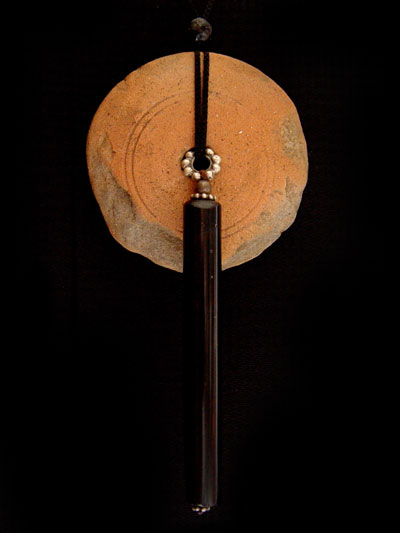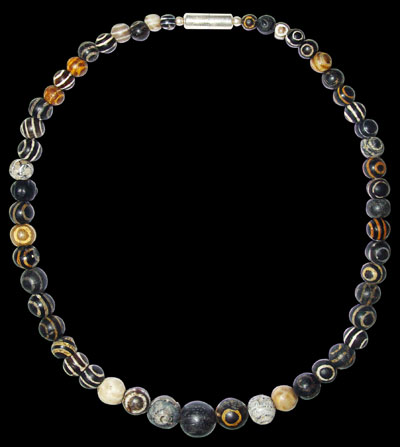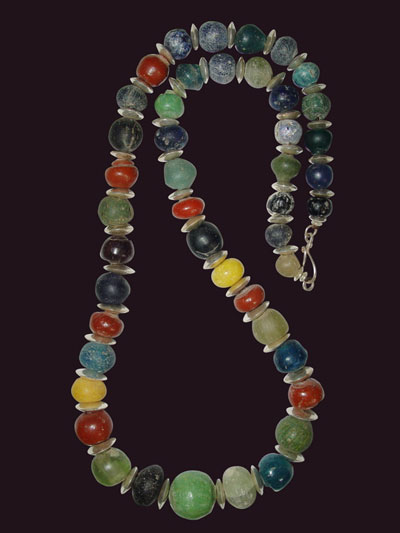|
As a researcher and collector, one of my passions is ancient beads. In private sectors, beads are very famous and are some of the most stunning and varied items of jewelry here. We adore beads like amulets and they have been one of the most popular forms of personal adornment. We have few Thai books regarding the history of ancient beads so I plan to write a book about beads in Southeast Asia especially in Thailand and in other major cultural and geographical regions. I love the way artists make beads as revealing and inspiring symbols of humanity's cultural and spiritual aspirations. I hope to finish my book within a few years.
For many years, beads have been charming and attractive enough for both old and new collectors in Thailand. It is the starting point for people who are interested in the origin of beads and the progress of all human societies in the world. Beads have been a human creation as far back as a thousand years ago in the prehistoric period. When humans began to live together in communities, they created permanent residences, and began cultivating crops and animal farms. Eventually, people sailed across the ocean to trade with other communities. It was believed they used beads as money in exchange for goods. But the history of beads lies in the comparison of appearances, styles, materials, origins and beauty of craft.
I contacted Thongchai Intraschusri, an artisan and ancient beads collector. He has possessed some of the most ancient beads in the world. Many geologists borrow his work for display in their books. Because of his research and knowledge, we knew that Mr, Thongchai (or Uncle Chai as he is affectionately called) was an expert on these precious beads.
Please tell us about the oldest beads found in Thailand. What do they look like?

Ok, I will start with these cylindrical rock beads. Their colors are either black or dark green., they were created approximately in the Bronze Age (1500 – 1000 BCE.) and Metal Age (500 BCE.). They are found at Tambol Ban Chiang, Nong Han district, Udonthani province and Bandontaped, Kanchanaburi province in Thailand. Moreover, Bronzeware, metal tools, accessories, bronze wristbands, earrings, rings and colorful beads are found there as well. From my own experiences with beads, I could tell which bead is authentic or fake, old or new. The methods of making a hole in ancient beads are different from the newer methods nowadays.
How about Ban Chiang in Thailand? I've heard that Ban Chiang used to be one of the oldest civilizations in Thailand. Many ancient beads in Thailand were created at that time. Is that correct?
Yes it is. At Ban Chiang and Tak hilltop we also found green and light blue beads made of potash glasses forged into stick shapes and the holes were made during forging process. There are also dark blue and dark green potash beads forged in hexagonal shape. Ban Chiang in Thailand is an excellent source of archeology and was the biggest center of beads production, import, export in Thailand as well. But I found some kind of these beads in Vietnam when I bought a sack of beads there.. Last year I bought a textbook about the museum of Vietnam. I found that the picture of a bead necklace is the same blue potash like Ban Chiang. I was confused. Vietnam also had many kinds of beads
[Uncle Chai picked two bead necklaces. The first one was dark green hexagonal beads and Indian gold beads. The second one was dark blue hexagonal beads and real silver beads. Both necklaces are very beautiful.]
I love that you use beads to decorate your house and put them on the wood models.
I am a man who loves to create art. Ancient beads should decorate houses, galleries and museums. I know that these ancient beads were buried within tombs a long time ago before people found them.
I have faith and belief that beads give us the protection and wealth for our next life.
Do you also have any natural beads?
Yes, I do have some sea shell beads. They were found at Kokpanomdee, Panasnicom district, Cholburi province. They are more than 3,000 years old. Beads made of coral from many countries such as China are very beautiful.
What kind of ancient beads are the most popular in Thailand?
I think Carnelian beads are very popular. They are over 2000 years old.. Mostly found in U-thong, Suphanburi province. They are circular in shape, have many sizes and their color is orange or dark orange. They may have come from India 2,000 years ago. These carnelian beads were used to make pendants for very important persons at that time. They were also found in Bandontaped, Kanchanaburi province.
[Uncle Chai picked up agate beads that have natural pattern and explained more.]
There were agate beads in stick shape and no holes. Presumably, they might have come from India with the holes made in Thailand. There are also agate beads that have an eye pattern. These are called "dzi beads" from Tibet.

At U-Thong, Supanburi province and Klongtom, Krabi provinces, we found colorful beads such as green, orange, gold. Glass beads in yellow, blue orange. Their ages are about 1,500 years. Mostly found in ancient communities like Dhavaravati Empire. All of these beads are called "Dhavaravati beads "and they were used for exchange goods at that time.

Omkoi district, Chiang Mai province, is a good place to look for ancient beads and antiques from China and many countries.
Uncle Chai picked up a small blue necklace and handed it to me. It gave me a lovely feeling and I thought that beads were wonderful to collect because in their small and mysterious way, they tell the story of ancient life and civilization. It is my task to follow and write the story about the journey of beads in Southeast Asia. It promises to be a task of love and delight.
|